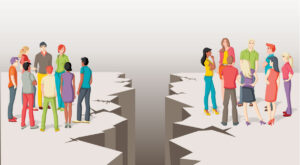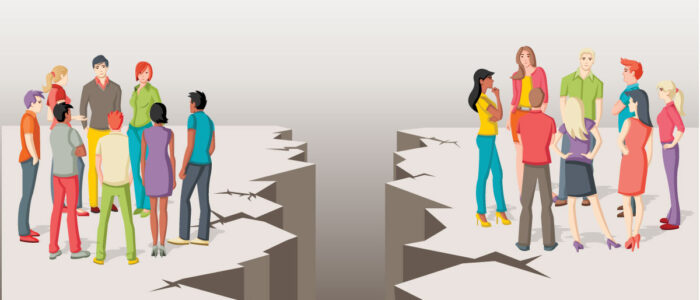 I heard several interesting interviews on NPR the other day. These were people who care about our country as much as I do. Who care about many of the same issues as I do. Who exhibit many of the same values. Thoughtful, kind, caring people. But people who have reached completely different conclusions about the state of the country, who is doing what, who thinks what, and what needs to be done.
I heard several interesting interviews on NPR the other day. These were people who care about our country as much as I do. Who care about many of the same issues as I do. Who exhibit many of the same values. Thoughtful, kind, caring people. But people who have reached completely different conclusions about the state of the country, who is doing what, who thinks what, and what needs to be done.
Among those conclusions is the certainty that I am wrong, that I don’t care about our country, that I actually want to destroy our country, and that I’m a horrible person. Not me specifically, of course, but everyone who falls in their bucket of “other.”
How is it possible to care about the same things and draw such opposite conclusions? Why are we so quick to identify, label, and vilify the “other,” those people with whom we have so much in common?
How Can We Be So Divided?
How can we reach such different conclusions?
I can only come up with one answer. We are operating from totally different “facts” and our perceptions of reality are unbelievably far apart.
How Is That Possible?
How did we develop opposing realities?
- We’ve been lied to.
- We are gullible.
- We hear what we want to hear.
- We leap to conclusions.
- We call it research when we find a couple of sources online that agree with our position.
- We hear and repeat what we believe until these beliefs practically become part of our identity.
- We can’t turn back and change our minds because we’ve invested too much energy and emotional capital in our conclusions.
And, we are all guilty of every single one of these behaviors. No matter what our political beliefs.
But We’ve Had Help
There used to be a handful of major broadcast networks, the Associated Press (AP), and newspapers known for and trusted because of their high journalistic standards. Any disagreement among these sources as to the facts of any matter were openly called out and corrections were promptly issued. There was little debate about the facts. Even little local newspapers included articles from the AP that we knew we could trust completely.
Furthermore, there used to be a clear distinction between facts and opinion. Print newspapers are still good about maintaining this distinction as they have separate sections clearly labeled Opinion and Editorial.
But we aren’t very likely to read print newspapers anymore. We don’t even necessarily visit newspaper home pages where those Opinion and Editorial labels are so conspicuous. Instead, we browse the Internet where news reports and opinion pieces are intermingled and stand alone, especially on Facebook, each speaking with authority and without that context that maintains the distinction between fact and opinion.
Broadcast news has also changed. The Morning News was news. The Evening News was news. Everything in between was obviously entertainment. When cable stations like CNN began broadcasting 24/7, the pure news became redundant and boring. Those Breaking News banners needed something to break. So the lines between pure news and opinion began to blur in the interest of providing more entertainment. Now you can turn to any channel from MSNBC to FOX and opinion flourishes with the trappings of newscasts. Anchors with power clothing and glasses that make them look smart sit behind news desks, point to headlines and maps, and play carefully selected video snippets. If they were delivering pure news we wouldn’t hate them or love them as much as we do. We just wouldn’t.
While the standalone, out-of-context news reports and opinion scattered across the Internet and 24/7 broadcasts have made it increasingly difficult to distinguish between facts and opinion, there has also been another factor at play here. When you browse or search the Internet, the articles that pop up can come from tried and true reputable sources such as the Wall Street Journal and the New York Times or they can come from a bazillion less credible sources, most of which are written by people with an agenda including extremists, lunatics, Russian operatives, and people who really do hate this country. Even the ones without an agenda are usually uninformed. The rest want your business. And all of them are becoming increasingly expert at using provocative headlines to draw you to their sites. All of them popping up in your searches as equals regardless of their honesty, motives, or knowledge. I’m afraid the distinction between fact and opinion has been lost. I’m afraid an appreciation and understanding of journalistic standards has gone the way of the dinosaurs.
Meanwhile, we have people with powerful voices actually promoting the legitimacy of “alternative” facts and realities, as if that’s possible. We have people bashing the reputable sources of news without distinguishing between fact and opinion. It’s one thing to disagree with the opinions expressed in a news source such as the New York Times, it’s another thing to suggest the facts presented in the news articles are fake.
We can’t operate successfully from totally different facts. There is no common ground in alternative realities. And without common ground, there is only us vs. them. There is no agreement on where things stand. There is no agreement on what needs to be done. There is no harmony. No progress. No peace. And very little love.
We have to be able to distinguish between fact and opinion. We have to dig up the facts. And we have to do that before we leap to conclusions. Before we become entrenched in a position that blinds us to conclusions that run against the grain. Before we condemn people as “others” who are in truth so much like ourselves. Before we succumb to those eager to manipulate us for their own purposes.
And this applies to each and every one of us.
Don’t be so darn sure of your facts. Recognize that you’ve been lied to. That you’ve been repeating things you’ve heard but can’t substantiate. That you hear what you want to hear. That you leap to conclusions.
It’s time for some serious skepticism. It’s time to ask more questions and spout fewer beliefs. It’s time to roll back some of your favorite conclusions and seek common ground. It’s time to distinguish between fact and opinion.
All of us. We can’t be so innocent that we fall into these traps. And we must not be guilty of the behaviors that exacerbate divisiveness. There is too much at stake. Way too much!
![]() This article first appeared on Forbes, August 29th, 2020
This article first appeared on Forbes, August 29th, 2020



Comments are closed.